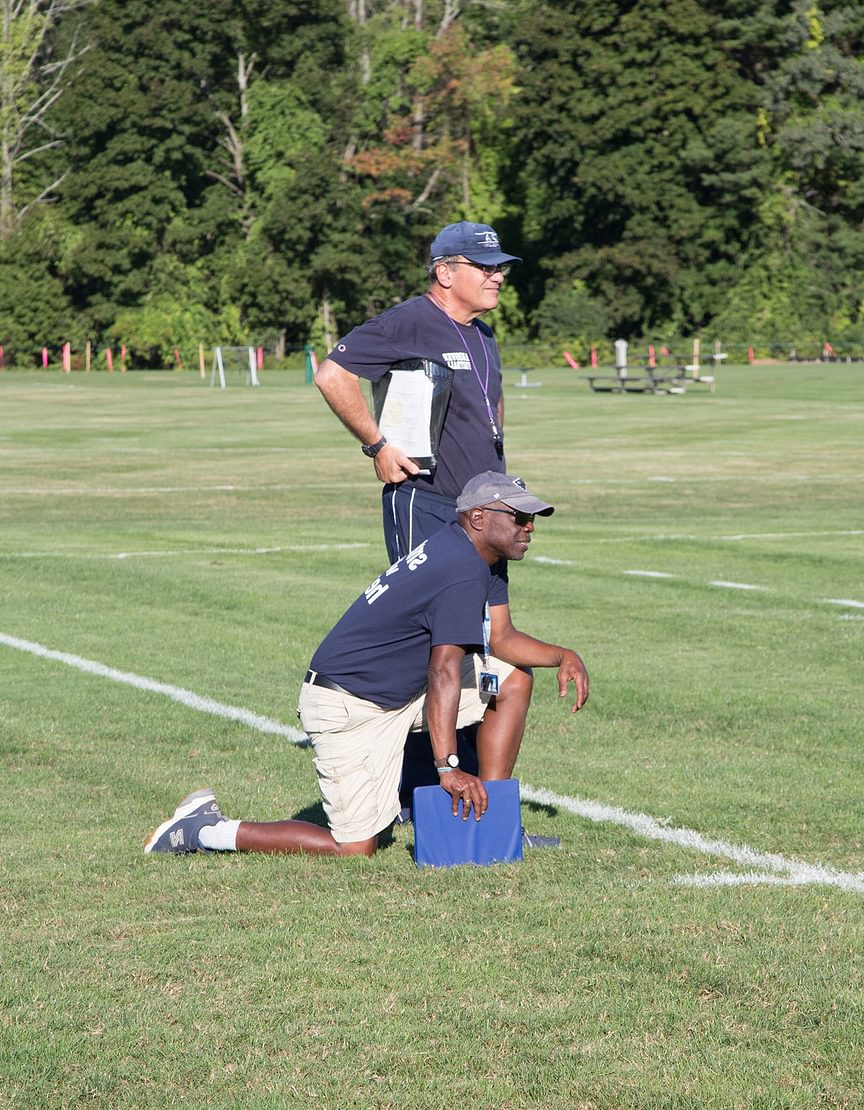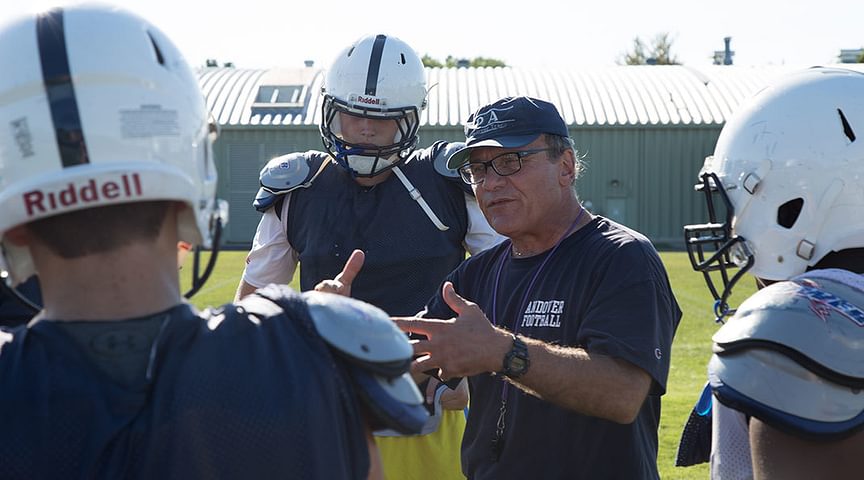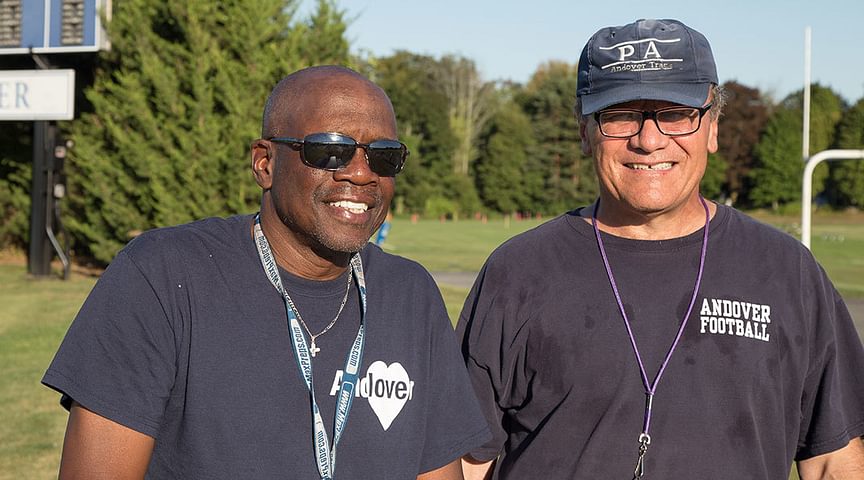
May 30, 2019
Brooklyn brotherhood
Lou Bernieri and Leon Modeste’s friendship goes beyond the gridironby Neil Evans
There used to be a bus. That bus would take students at Poly Prep Country Day from the safe harbor of campus to the closest subway station. But that bus didn’t run after football practice. And for a young Leon Modeste sometimes it would be a challenge to walk those several blocks from the stadium to the turnstiles in Bay Ridge. One time a shop keeper may have said some things that made Modeste walk a little quicker.
You see, Brooklyn in the early seventies wasn’t the gentrified hipster capital of millennials that it is today. Back then you didn’t leave your neighborhood. You didn’t even think of going to other neighborhoods because the mere concept was unfathomable. It just wasn’t something you did. Unless you had a place to be.
“The racial lines weren’t crossed,” says Modeste. “Except at the school and on the teams.”

Poly Prep Country Day School sits next to the Verrazano-Narrows Bridge in the shadow of Fort Hamilton Army base in western Brooklyn. Poly served as sanctuary for young men from across the city to unite and embrace the diversity within the school’s population. This is where Leon Modeste, hailing from the African-American communities of Brooklyn and Crown Heights, and Lou Bernieri of the Italian-American stronghold Bensonhurst, met in ninth grade.
Modeste, a flashy running back, and Bernieri, a bruising lineman, became fast friends through their love of football and the dependent nature of their positions on the gridiron. Their inseparable bond was cemented when they had the opportunity as freshman to be in the varsity locker room. It was an honor and privilege the young boys did not take lightly. They earned it on the field and instantly became part of the Poly football family.
So when word got around to one of the Italian fathers of a teammate that Modeste was having some issues with a certain shop keeper on his walk to the subway after practice, the problem was suddenly taken care of, unbeknownst to Modeste. The next week that same shop keeper greeted the standout rusher with potato chips and a soda.
Modeste and Bernieri share a laugh thinking back on the story now, but this was their reality—best friends and teammates on the field and at school yet segregated elsewhere.
Non sibi — every school in the world wishes that was their school motto. It’s not about me; it’s about we.
”After stellar campaigns at Poly, both continued their football careers collegiately, Modeste at Springfield College and Bernieri at Harvard. The two kept in touch and followed each other’s successes. In the days before internet and cell phones, Poly alumni events and newsletters kept them connected.
Bernieri arrived at Phillips Academy in the fall of 1977 as an English instructor and football assistant. “Andover was a really different place when I first got here,” says Bernieri. “A lot of sexism, people who resented the change to coeducation, even some race issues.” Yet during his tenure at the school Bernieri marvels at the growth and evolution of the community. “Race, class, gender—it’s amazing to see the kinds of conversations we’re having now.”
When a football coaching vacancy presented itself in the fall of 1986, Bernieri knew exactly who to contact.
“I didn’t want to leave Brookyln. I thought I was going to be in Brooklyn the rest of my life,” says Modeste who had returned to the borough after college to coach at Poly and St. Anne’s School. “But I drove up and the place was so vibrant. I have absolutely no regrets.”
That’s not to say Modeste hasn’t matured, like football itself, over the past 30 years. “I was probably too controlling early on,” admits Modeste. “It’s the kids’ game. It’s not my chess board. I’ve lightened up.”
“Our role models as coaches were barbarians—Vince Lombardi types. That’s what we learned back then,” adds Bernieri. “My trajectory with sports and the classroom has been the same. I came in with certain models but you learn to grow and progress.”

The expectations of coaches have also dramatically shifted. Andover football once prioritized winning above all else and promoted the exclusive use of post graduates to enhance competition. Under Modeste’s leadership as Athletic Director, the program preaches unity, cooperation, support, development, selflessness and character.
“Non sibi — every school in the world wishes that was their school motto,” says Modeste. “It’s not about me; it’s about we.” Your team, your friends, your family.
This philosophy extends beyond the football field. Both coaches see the game as an extension of the classroom believing education and training with accountability and freedom in decision making leads to optimal lifetime learning. The goal is to create highly skilled and independent student athletes that can diagnose a cover two zone coverage just as easily as they interpret The Iliad.
Clearly this is not the same brand of football Modeste and Bernieri grew up on. Much is different yet the most important qualities—hard work, sacrifice, brotherhood—remain.
“After certain games, like say Exeter, you’re centered. This is where I want to be,” says Modeste reflecting on his coaching career and relationship with Bernieri. That feeling of euphoria, faces in the crowd beaming, players radiating pure joy—those are the moments that have carried both men through the trenches between the lines and through a life-long friendship. The emotions experienced and engrained over 40 years ago in Brooklyn still resonate today.
“You don’t want to be anywhere else in the world because life doesn’t get better than that.”





